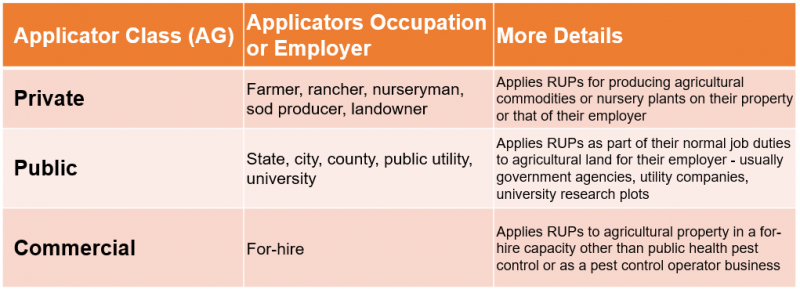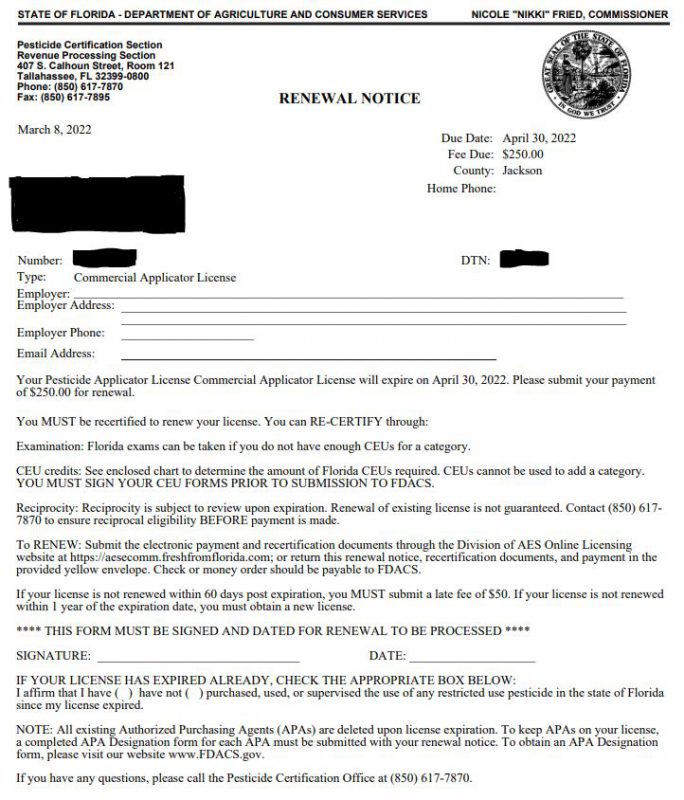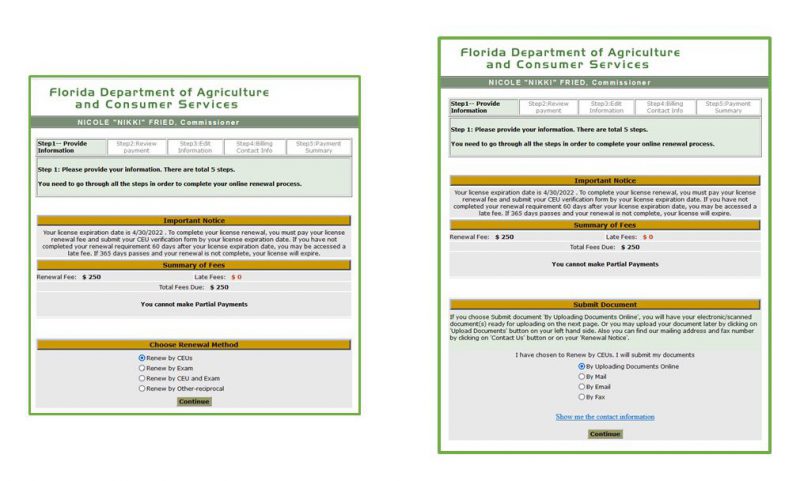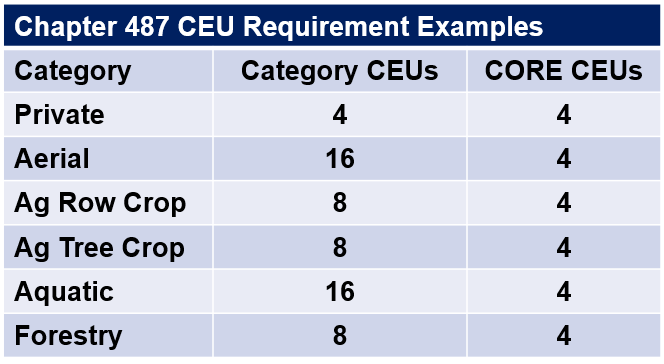
If you apply restricted-use pesticides (RUP), federal law requires you to be certified or work under the direct supervision of a certified applicator. In Florida, the type of license you need depends on where you will be applying pesticides and your job. Credit: Doug Mayo, UF/IFAS
After each pesticide training or production meeting where CEUs are offered, I am always surprised to learn that many of the applicators are unfamiliar with the pesticide licensing process and how to keep their licenses current. The purpose of this article is to answer some of the most frequently asked questions regarding agricultural pesticide licensing.
–
Who is in charge of pesticide licensing?
The Florida Department of Agriculture and Consumer Services (FDACS) is responsible for administering pesticide licenses in the state of Florida. UF/IFAS Extension is responsible for providing trainings and administering exams for individuals wanting to obtain a license as well as administering continuing education credits (CEUs) for license renewal.
–
How do I know if I need a pesticide license?
If you apply restricted-use pesticides (RUP), federal law requires you to be certified or work under the direct supervision of a certified applicator. Additionally, certification may be required by your employer.
–
How do I know which type of pesticide license I need?
This depends on where you will be applying pesticides and your job. Licensing is issued under the three Florida Statues:

–
The majority of applicators that the UF/IFAS Panhandle Agriculture Team assists will fall under Chapter 487 applicators. Under this law, there are three license classifications that applicators can fall under:
 –
–
–
For more information, please visit: Finding the Correct Pesticide Applicator License in Florida
–
How do I obtain a pesticide license?
All applicants for a pesticide applicator license must pass one or more examinations for initial certification. A passing grade of 70% is required on all exams.
–
Private License:
Two exams are required to obtain a private applicator license:
- General Standards (CORE) exam; and
- Private Applicator Ag Pest Control exam
–
Public and Commercial License:
- General Standards (CORE) exam; and
- Exams for each category of intended use
–
Where do I take my pesticide licensing exam?
Pesticide applicator certification exams can be taken in-person at your local Extension Office or online at any time by following the steps listed here: https://pesticideexam.ifas.ufl.edu/
–
Is there a fee to take the exam?
For Chapter 487 applicators, there is no fee to take the exam in-person. There is however, a $26 fee to test online remotely. For more information about remote testing Pesticide Testing At Home NOW LIVE! and for a video of what this looks like Everblue Testing Expectations
–
How much does a license cost?
- Private and Public: $100
- Commercial: $250
–
How do I keep my license current and up-to-date?
License renewal is required every four years. With renewal comes recertification. Applicators have the option of recertifying by either retaking the certification exam or accumulating continuing education units (CEUs) during the four-year license period. Most applicators opt for the latter.
–
Where can I earn CEUs?
CEUs are earned by attending professional meetings, seminars, workshops or by completing online courses that have been approved by FDACS. Many Extension production meetings offer CEUs for free or at a discounted rate.
The UF/IFAS Pesticide Information Office offers a variety of online CEU courses for a discounted rate: Pesticide Information Office (instructure.com)
Another option for earning free CEU credit is through the ‘CEU Central’ segment of Citrus Industry Magazine. Each year, the magazine releases a series of articles that applicators simply read and submit the accompanying test for grading. Once approved, 1 CEU credit is granted per article. Up to 4 CORE CEUs per year can be earned this way.
To search available CEU classes, please visit: https://aessearch.fdacs.gov/AvailableClassSearch.asp
–
How many CEUs do I need for renewal?
The number of CEUs required for renewal depends upon the type of license and category.
How many CEUs do I have?
During the four-year period, it is ultimately the applicator’s responsibility to keep up with any earned CEUs. Many Extension Offices that offer CEUs, do however, keep CEU records on hand.
FDACS also has an earned CEU search tool: https://aessearch.fdacs.gov/EarnedCEU.asp
Keep in mind though, that not all CEU providers enter CEU record attendance into the FDACS system so the CEU count listed online may not always be accurate.
–
How do I renew my license?
FDACS sends renewal notices to all licensees approximately 60 days before the license expiration date. In order to renew, the applicator must complete the renewal notice, send in their CEUs and their payment. You can pay your renewal fee and upload your documents online at: https://aesecomm.fdacs.gov

An example renewal notice for a commercial license. Renewal notices may come via traditional mail but more likely email.
–

Screen shots from the renewal process on https://aesecomm.fdacs.gov showing options for renewal method and ways to provide CEUs. Note: The example is for a commercial license, hence the $250 fees shown.
–
What happens if my license has expired?
Once your license is expired it would be illegal for you to purchase or use RUP products. The date on your license is the date you are no longer considered certified. There is a grace period of 60 days after your license has expired for renewal without any additional fees. After this grace period expires, the applicator will be charged a $50 late fee for renewal. After 365 days from expiration the license is permanently expired, meaning a new license is needed and ALL examinations must be retaken.
–
For more information on pesticide applicator licensing, please visit:
Finding the Correct Pesticide Applicator License in Florida
- Explore Blackberry Production at the 2025 Blackberry Field Day – June 18 - May 30, 2025
- Produce Safety Alliance (PSA) Grower Training – May 23 - April 11, 2025
- Mechanical Pruning of Citrus Groves - March 7, 2025

